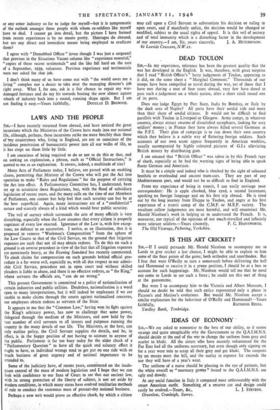DEAD TOULON
SIR,—In my experience, tolerance has been the greatest quality that the war has developed in the English. It was, therefore, with great surprise that I read "British Officer's" hasty judgement of Toulon, appearing as it did, on the same sheet a. "Marginal Comment." Thousands of our troops have been compelled to travel during the war, yet of those that I have met during a tour of four years abroad, very few have dared to pass such a judgement on a whole nation, after a short stroll round one of its ports.
Does one judge Egypt by Port Suez, India by Bombay, or Italy by the dock area of Naples? All ports have their sordid side and more than their share of sordid citizens. It would not be difficult to find parallels with Toulon in Liverpool or Glasgow. Army camps, in whatever country, always attract swarms of dissatisfied sycophants, looking for easy soldiers' money ; in France they have always killed several Germans in the F.F.I. Their plan of campaign is to run down their own country which they believe is a subtle way of flattering foreign soldiers. Such accounts of our own scum appear frequently in American weeklies, usually accompanied by highly coloured pictures of G.I.s alleviating British misery by distributing gum.
I am amazed that "British Officer" was taken in by this French type of shark, especially as he had the warning signs of being able to speak fluent German and American.
It must be a simple soul indeed who is shocked by the sight of coloured brothels or overloaded and ancient tram-cars. They are part of any Mediterranean port, and would not be so difficult to find in England.
From my experience of being in transit, I can easily envisage your correspondent: He is apple checked, blue eyed, a second lieutenant, speaking no foreign language and on his first trip abroad. He is tired out by the long journey from Dieppe to Toulon, and angry at his first experience of a transit camp of the C.M.F. or M.E.F. variety. The resultant callow judgements are most harmful, and will counteract Mr. Harold Nicolson's work in helping us to understand the French. It is, moreover, not typical of the opinions of our much-travelled and infinitely more tolerant soldiers.—Yours sincerely, F. C. HAINSWORTH. The Old Vicarage, Pickering, Yorkshire.






























 Previous page
Previous page